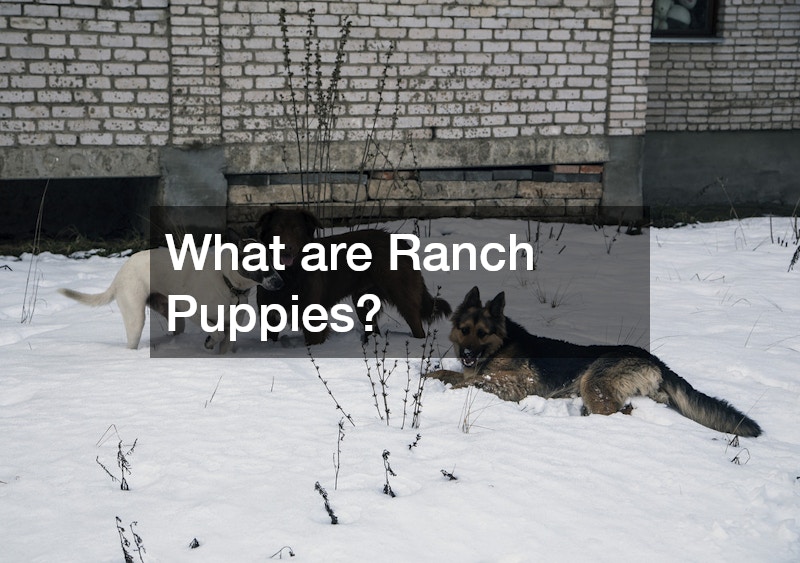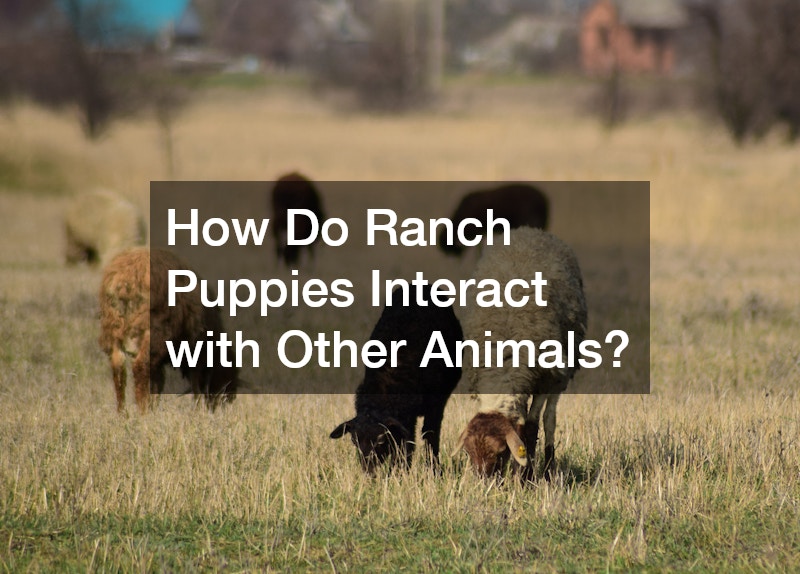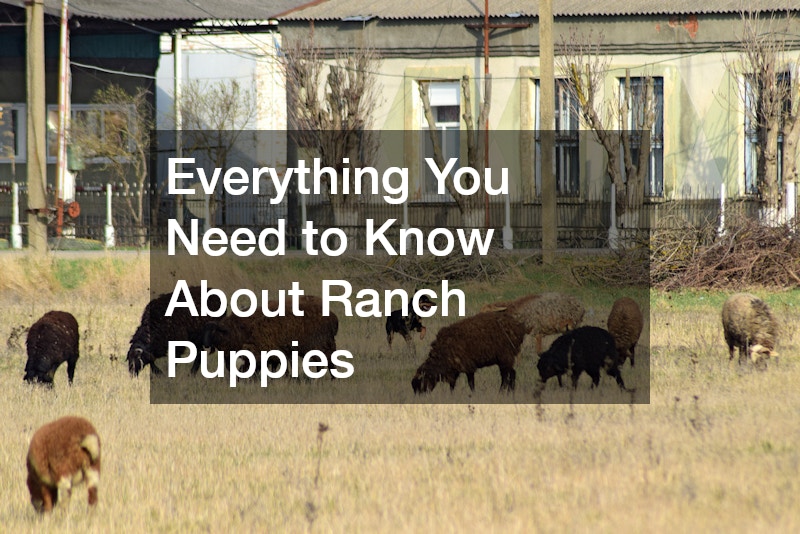Ranch puppies hold a special place in the hearts of dog enthusiasts and animal lovers alike. These hardworking, loyal, and spirited companions are much more than typical pets—they are partners in adventure, guardians of the home, and symbols of the rugged charm associated with ranch life. Whether you’re drawn to their vibrant personalities, practical capabilities, or the sheer joy they bring, ranch puppies have something unique to offer to every type of dog owner.
In this comprehensive guide, we will explore everything you need to know about ranch puppies. From their distinctive traits and roles to their specific care requirements, this article will provide a deep dive into what makes these dogs so special. Whether you’re considering adopting a ranch puppy or are simply curious about their characteristics and lifestyle, you’ll find valuable insights to guide your understanding and appreciation of these remarkable animals.
Ranch puppies aren’t just about the utility they bring to a rural or farm setting. They are companions that form strong bonds with their humans, providing loyalty, love, and a sense of purpose. If you’ve ever wondered what sets a ranch puppy apart from other breeds, this guide will highlight their unique qualities, care considerations, and why they are such a beloved choice for families and ranchers alike.
In addition to exploring their traits, this guide will touch on practical aspects of raising a ranch puppy, such as training, health care, and integrating them into your daily life. Whether you live in a sprawling rural landscape or a more confined suburban setting, ranch puppies can adapt and thrive with the right attention and preparation. This adaptability is one of the many reasons they stand out among dog breeds.
What are Ranch Puppies?

Definition and History
Ranch puppies are dogs bred or raised in ranching environments, often selected for their working capabilities and adaptability. Historically, they have been essential for herding, guarding livestock, and offering companionship in the demanding landscape of a ranch. Their lineage often includes breeds like Border Collies, Australian Shepherds, and Heelers, known for their intelligence and work ethic.
Different Breeds Commonly Found on Ranches
Common breeds include:
- Border Collies: Renowned for their agility and intelligence, they’re often employed for herding tasks.
- Australian Shepherds: With their boundless energy, they thrive in active ranch environments.
- Great Pyrenees: These gentle giants are excellent livestock guardians.
Each breed contributes unique skills, making them invaluable in ranch settings.
Characteristics and Traits
Ranch puppies are typically:
- Energetic and playful
- Highly intelligent and trainable
- Adaptable to different climates
- Loyal and protective of their families
Differences Between Ranch Puppies and Other Puppies
Unlike urban breeds, ranch puppies are bred for stamina and work. Their physical and mental needs often exceed those of typical family pets, requiring plenty of space and stimulation.
Why Choose a Ranch Puppy?
Ranch puppies are much more than just adorable companions; they are loyal, hardworking, and intelligent dogs bred to thrive in active, outdoor environments. Choosing a ranch puppy is a decision that goes beyond aesthetics, as these dogs bring a unique set of qualities that can enhance your lifestyle in countless ways.
Unmatched Loyalty and Companionship
One of the most remarkable traits of ranch puppies is their loyalty. These dogs form deep bonds with their families and are known to be protective and attentive. Whether you’re spending a quiet evening at home or working outdoors, your ranch puppy will be by your side, offering companionship and unwavering affection.
A Perfect Fit for Active Lifestyles
If you enjoy outdoor activities or have a job that requires physical tasks, a ranch puppy can be an ideal partner. Their energy levels are perfectly suited for hiking, running, or working on a farm. Ranch puppies love to be active and engaged, making them a natural fit for people who share their zest for life.
Adaptability to Roles and Environments
Ranch puppies are versatile and can adapt to various roles, from herding livestock to being a family protector. Their intelligence and trainability allow them to excel in tasks tailored to your needs. They can also adapt to different environments, whether you live on a sprawling ranch or a large suburban property with plenty of outdoor space.
A Natural Instinct for Work
Unlike many companion breeds, ranch puppies are bred to have a strong work ethic. This makes them excellent choices for people who need a dog with a purpose. Herding breeds like Border Collies or Australian Shepherds, for example, have instincts that can be harnessed for tasks such as managing livestock or even guarding property. Their willingness to work makes them a joy to train and watch in action.
Great for Families
Ranch puppies are excellent family dogs, especially for households with children. Their friendly and playful nature makes them a hit with kids, and they are often patient and gentle. Including your children in activities like feeding, walking, or basic training strengthens their bond with the puppy while teaching responsibility.
Benefits of a Hardworking Companion
Beyond their lovable personalities, ranch puppies bring practical benefits. They can serve as watchdogs, alerting you to potential dangers, or assist with tasks like guarding livestock. Their sharp instincts and intelligence mean they can pick up commands and routines quickly, making them reliable partners in everyday life.
How to Care for Ranch Puppies?

Dietary Needs
Ranch puppies require high-quality, nutrient-dense food to fuel their active lives. Opt for dog food rich in protein and healthy fats. Puppies under one year may need specialized diets to support growth.
Exercise Requirements
Physical activity is essential. Activities such as herding drills, hikes, or games of fetch help channel their energy productively. For families, simple activities for young children like playing ball can also involve the puppy, ensuring physical and social stimulation.
Grooming Tips
Regular grooming is critical for ranch puppies. Engaging a local dog groomer ensures their coats remain clean and mat-free. For breeds with double coats, seasonal shedding may require more frequent attention.
Health Checks and Vaccinations
Schedule regular checkups with an emergency veterinary service to stay ahead of potential health issues. Vaccinations and parasite prevention should be prioritized, as ranch puppies often encounter outdoor risks.
Socialization and Training
Introduce them to various environments and animals early to build confidence and reduce anxiety. Structured training sessions will help them develop essential skills, as well as early exposure to pet boarding where they can interact with other dogs.
What is the Ideal Environment for Ranch Puppies?
Rural vs. Urban Living
Ranch puppies thrive in rural areas where they have room to roam. While they can adapt to urban settings with enough exercise, rural environments align with their natural tendencies.
Indoor vs. Outdoor Accommodations
A mix of indoor and outdoor living works best. Outdoor spaces should be secure; consider a chain link fence install to keep them safe.
Space Requirements
Ample outdoor space is crucial for their physical and mental well-being. Large yards or open fields allow them to exercise freely.
Climate Considerations
Certain breeds are better suited for specific climates. Great Pyrenees, for example, handle cold weather well, while Australian Shepherds are more adaptable to heat.
Safety Precautions
Ranch puppies are naturally curious and may wander. Secure fencing, pest control measures, and supervision near livestock help ensure their safety. Additionally, allowing ranch puppies to see the outdoors helps to curb their curiosity. Consider investing in glass or screen door replacements that will allow your puppy to see outdoors and watch over your home.
How Do Ranch Puppies Interact with Other Animals?

Interaction with Livestock
Many ranch puppies are instinctively good with livestock. Breeds like Border Collies excel at herding, while others, like the Great Pyrenees, are protective guardians.
Coexisting with Other Dogs
Socialized early, ranch puppies typically get along well with other dogs. They often form close bonds with canine companions, creating a harmonious pack dynamic.
Behavior Towards Cats
With proper introductions, ranch puppies can learn to coexist peacefully with cats. Early training helps minimize prey drive.
Response to Wildlife
Ranch puppies are alert to wildlife, making them excellent watchdogs. Training helps mitigate unwanted chasing or barking.
Training for Specific Roles
Ranch puppies often learn roles like herding, guarding, or hunting. Tailored training ensures they excel in their specific duties.
What are the Common Health Issues in Ranch Puppies?
Genetic Disorders
Certain breeds are prone to genetic issues like hip dysplasia or vision problems. Routine checkups with an emergency vet clinic can catch these early.
Injuries and Accidents
Active lifestyles can lead to injuries. First-aid knowledge and a stocked medical kit are essential.
Parasites and Pests
Ticks and fleas are common in outdoor environments. Effective pest control measures and regular grooming can minimize infestations.
Preventative Healthcare
Routine vaccinations, deworming, and dental care are crucial for maintaining health.
Recognizing Signs of Illness
Watch for lethargy, loss of appetite, or unusual behavior, and consult a veterinarian promptly if concerns arise.
How to Train Ranch Puppies?
Basic Obedience Training
Teach commands like sit, stay, and come early to establish control and build trust.
Advanced Skills and Commands
Depending on their role, ranch puppies may need to learn herding techniques, livestock guarding, or search-and-rescue skills.
Lifestyle and Work Training
Align training with their daily tasks. For example, training herding breeds with livestock or creating guarding routines for protective breeds.
Training Tools and Techniques
Use tools like clickers or whistles for communication. Positive reinforcement ensures they remain motivated.
Dealing with Behavioral Issues
Address issues like nipping or excessive barking immediately. Consistency and patience are key.
What Supplies Do Ranch Puppies Need?

Essential Gear
Collars, leashes, and identification tags are must-haves for safety and security.
Comfort Items
A cozy bed or blanket provides comfort during downtime, especially after a day outdoors.
Training Equipment
Herding breeds may benefit from tools like agility poles or training dummies.
Health and Medical Supplies
A first-aid kit and regular flea treatments are vital for ranch puppies exposed to the outdoors.
Feeding Essentials
Invest in durable food and water bowls. Automatic feeders can be helpful for busy schedules.
What are the Costs Involved with Ranch Puppies?
Initial Purchase or Adoption
Purebred puppies from breeders can range from $500 to $2,000, while adoption fees are typically lower.
Monthly Maintenance Costs
Expect expenses for food, grooming, and routine veterinary care.
Unexpected Expenses
Emergencies like injuries may require costly treatments. Pet insurance can offset unexpected veterinary bills.
Insurance Options
Pet insurance plans vary widely but often cover accidents, illnesses, and preventative care.
Budgeting Tips
Set aside a monthly budget for regular expenses and an emergency fund for unforeseen costs.
Where Can You Find Ranch Puppies?
Breeders vs. Adoption
Breeders often provide purebred puppies with documented lineage, while adoption offers the chance to rescue a dog in need.
Rescue Organizations
Many organizations specialize in herding breeds or working dogs, offering ranch puppies for adoption.
Questions to Ask Breeders
- What is the puppy’s lineage?
- Are health clearances available?
- What socialization has the puppy received?
Evaluating a Rescue Puppy
Assess their temperament and health before adopting. Spend time interacting with them to ensure a good match.
The Adoption Process
Adoption typically involves an application, interview, and home visit to ensure the puppy will thrive in your care.
How to Integrate Ranch Puppies into Family Life?
Introducing to Family Members
Gradual introductions help new puppies acclimate to family dynamics. Supervise early interactions with children.
Creating a Routine
Establish a consistent schedule for feeding, exercise, and training to help them adapt.
Balancing Work-Life and Puppy Care
If you’re managing household tasks like hardwood refinishing, ensure someone is available to supervise the puppy.
Involving Children in Care
Teach children age-appropriate responsibilities, such as filling water bowls or helping with simple grooming tasks.
Handling Challenges
Common challenges like chewing or house-training require patience and consistent reinforcement. Ensure you have reputable carpet cleaning services available to you for the inevitable puppy accidents that will arise.
Ranch puppies offer more than companionship—they bring energy, loyalty, and a touch of rural charm into your life. Whether you’re looking for a working partner or a family pet, ranch puppies thrive with the right care, environment, and training. By understanding their unique needs and characteristics, you can create a fulfilling and harmonious relationship with your new furry friend.
Incorporating a ranch puppy into your life is an investment in love and loyalty that will pay off in countless ways, from their playful antics to unwavering devotion.
